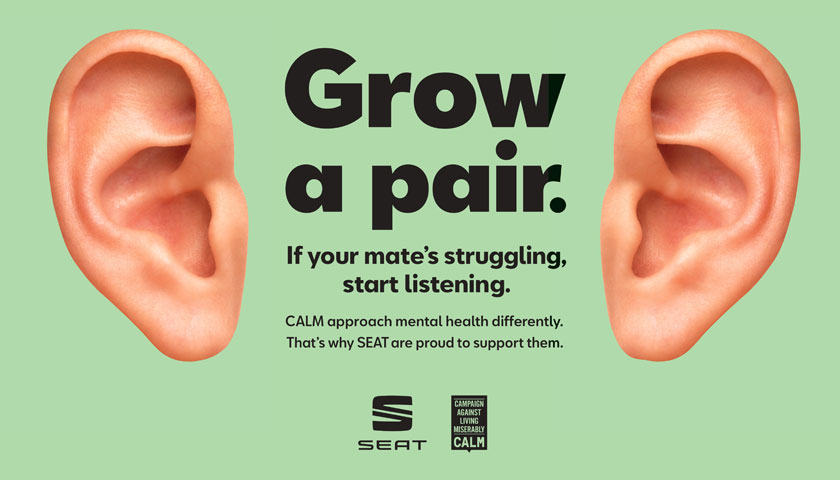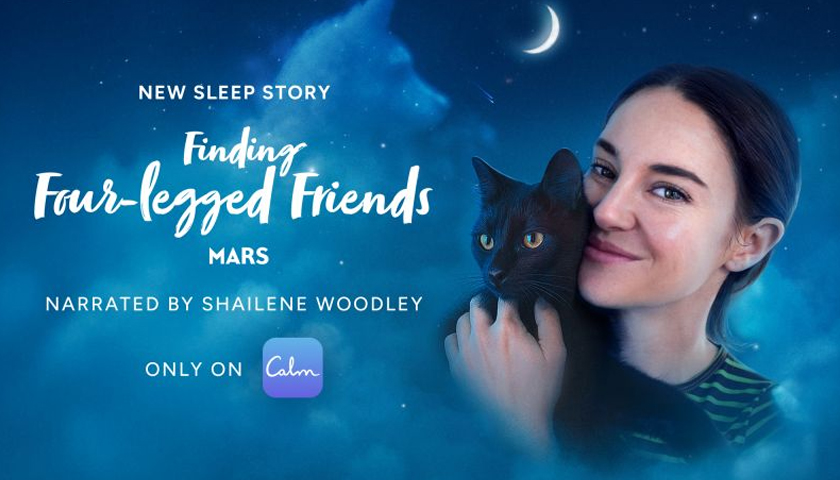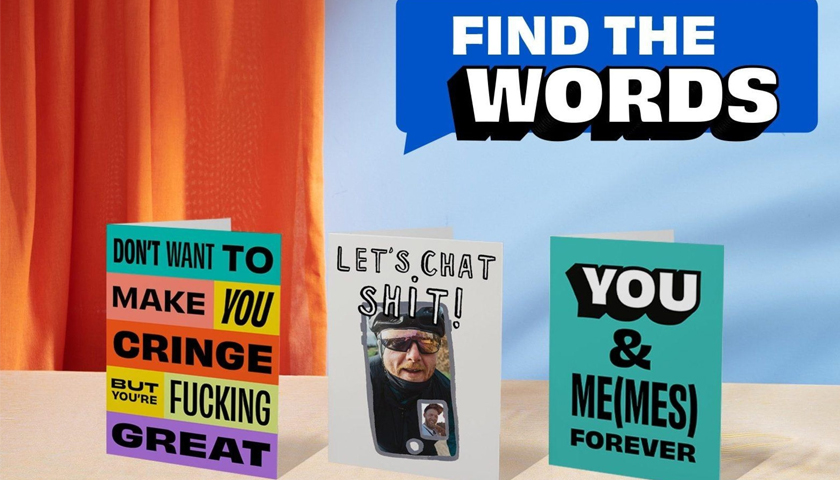CALM have teamed up with SEAT to say “Grow a pair”. Because sometimes the bravest thing you can do for someone is set everything else aside, including your judgement – and just listen.
We often hear how talking to someone about how you’re feeling can really turn things around, but what about the person on the listening end of that conversation? With our Grow a Pair mural in partnership with SEAT, we focus on the listeners; the mates, the family members, colleagues, partners and peers who are there when things are difficult.
Just being there to listen to your mate can be powerful thing – something we touched on with our Best Man Project and Be The Mate You’d Want campaigns. But knowing how to respond and what to say to someone who may be in crisis can be daunting. Truth is, there’s not one correct way to listen. There’s no rule book. We spoke to some CALM supporters to get a few interesting and funny lessons they learnt along the way…
https://www.instagram.com/p/BxAYHrZpebc/?utm_source=ig_embed
“We wanted to challenge and poke fun at damaging phrases like ‘Grow a Pair’ while underpinning an important message. Everyone has a role to play in reducing the stigma around seeking support – there’s no one correct way to listen to someone who may be struggling, different things work for different people and circumstances, and the storytelling we are exhibiting around this mural shows that.”
Simon Gunning, CEO of CALM
On worrying before the chat…
Jonathan: He said he wanted to talk about something big, but that could have been anything from becoming a father again to news about the next Star Wars film!
Jane: It was awkward at first, we never really spoke about how we feel apart from when we were drunk as teenagers! As per usual we quickly turned everything into a joke.
Lee: I worry about not giving the right advice, or pushing people too far as they may not be ready or in the right place to push themselves or hear certain things, so it’s about finding the right balance and reading people, their reactions, behaviour and body language as you are talking. Trying to judge if you’re heading in the right direction for them.
Rikesh: There have been times where the conversations have been quite serious, i.e., a friend contemplating reasons to remain alive. In those situations, you can’t help but feel scared, worried, whether what you’re doing is enough to genuinely make them feel better. After having one particularly heavy conversation, it was all I was thinking about for the remaining few days. I think it’s impossible not to worry about this. Every situation is specific to that individual – it’s impossible to read their minds so all you can do is hope you’re saying what they need to hear. Sometimes, however, it’s best not to say anything or give advice at all, but just to let them vent and for you to be there to listen.
The bits that were hard…
Jonathan: It was very difficult to hear that my best friend since childhood, the best man when I got married and the god father of my child was in such a bad place, that the only way he could see out was taking his own life. I’m not a particularly emotional person so dealing with what was coming out was not easy. Luckily my wife was there to do a lot of the emotional heavy lifting.
Jane: Trying not to lecture was difficult! No one needs anyone being told what to do/how to feel. Also being told that he tried to take his own life, what can you say. I was just so sorry that he didn’t feel he could have spoken to me before.
Lee: The thing I find difficult sometimes is hearing other peoples problems and hearing the awful things that they have gone through. Sometimes its hard to take them on board especially if I’m having a bit of a tough time myself. But we are all in it together and in the same boat so we help each other through. It can be mentally challenging sometimes.
On the best place to have the chat…
Jonathan: Our main outlet for talking and discussing things is when we run (and after).
Lee: Some people prefer to chat face to face, recently I’ve even been teaming up with fans with rival football clubs and walking and talking with them. Others feel more able to open up on social media as find it hard to speak out in front of people.
Rikesh: I find people tend to be a lot more open and honest about their situation and feelings when speaking online – via Instagram, Twitter, Facebook. Most of my friends have spoken to me via these methods. Very occasionally I’ll have a face-to-face, and this is usually when it’s very serious, or when it sort of comes naturally into conversation – but it’s often very light-hearted and casual in the latter circumstances.
Surprising lessons…
Jane: To be more open with everyone. Life is not filtered and it’s amazing how many conversations I’ve now had with people who say they’re struggling. Our brain is an organ that can get sick. I have crohn’s disease, I can go for years being absolutely fine, then wham, for not apparent reason I’m so sick I have to undergo several operations. The joy of my illness is that I’m admitted to hospital, there are scars (not that anyone needs to see them!), so I get flowers and sympathy. This does not happen with mental illness and that needs to change.
Rikesh: I’ve really struggled speaking to people when they’re having anxiety attacks. But after dealing with a few of these, I learnt how and what worked best for them – some need distraction, others need physical embrace (a really long hug, basically), others need humour, others need breathing exercises. It really is its own beast.
Jonathan: When running with CALM, a few times I have been explaining that I do it for my best friend, this usually elicits an ‘awwww’ from the other runner and a sad head tilt. They get a bit of a shock when I point out the smiley, goofy idiot standing behind them full of life… it’s nice to change their perception of what someone who tried to take his own life looks like!
On what changed after…
Rikesh: I always try to go into these situations and think, ‘what would I need right now if the roles were reversed?’ If someone is willing to open up specifically to you, it’s imperative to learn about what their issue is, how they handle it, what they respond to. Because the likelihood is, is that they will speak to you again should they need. And you want to be able to ensure you’re adapting what you say or what you do to what they really need in that moment. Factoring all this in, I think it has made me a lot more confident in being able to speak to someone who comes to me feeling a particular kind of way.
Lee: It’s helped me feel more confident. Having suffered for a number of years myself and not opening up, I feel CALM has given me a new lease of life, which has now made me ready and confident enough to help others the way I was helped and hopefully prevent any harm coming to them.
Jane: This has brought us together. Now we chat whenever. I was just selfishly getting on with my own life, in my own little bubble, trying to keep it all together. Now I am so much more aware of how my family are feeling, and we are no longer unconsciously drifting apart, but have been brought closer than we have been in years.



